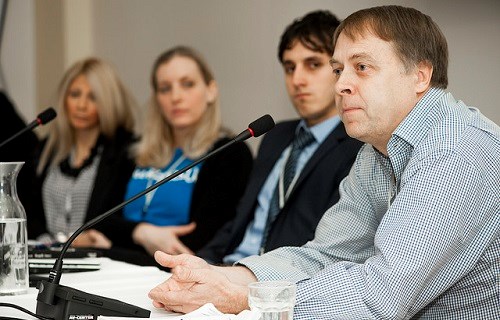Azerbaijan’s rise to prominence – nation building or sportswashing?

Talking about human rights and the European Games 2015 in Baku, Azerbaijan were (from the left) Gulnara Akhundova, Rebecca Vincent, Rasim Adjalov and David Bloss. Photo: Thomas Søndergaard/Play the Game
26.10.2015
By Marcus HoyAzeri sport is on the rise. The 2015 state-funded European Games in Baku will be followed by the Formula One’s European Grand Prix in June 2016 and the Islamic Solidarity Games in 2017. However, according to human rights activists Rebecca Vincent and Gulnara Akhundova, a desire to prevent criticism has resulted in the arrest of many journalists and human rights activists, the barring of international foreign correspondents, and a ban on Amnesty International.
Vincent and Akhundova, who work for the International Media Support and Sport for Rights Campaign, spoke of an atmosphere reminiscent of the former communist era where critical voices are silenced and journalists intimidated. The clampdown, they said, had continued after the European Games were over and showed little sign of abating.
Among the regime’s victims, they said, were Rasul Jafarov, founder of the Sports for Rights campaign, who was imprisoned on charges of tax evasion and running an illegal business. Rasim Aliev of the Institute for Reporters’ Freedom and Safety was brutally beaten to death in August. A crackdown on nongovernment media had led to threats being made on the staff of the independent TV station Maydan TV and their families.
However, they pointed out that the deterioration in Azerbaijan’s human rights record had led to weaker relations with the European Parliament and the OSCE. Some of Europe’s national Olympic Committees, most notably Germany’s had been highly critical of the practices in Azerbaijan, they said. However, other sporting officials say that it is not their role to get involved in the internal affairs of countries. Singled out for criticism was Formula One boss Bernie Ecclestone who recently stated that “Everybody seems to be happy [with Baku hosting a Grand Prix] there doesn't seem to be big problems”.
“Failing to take a stand is helping nations like Azerbaijan to sportswash their image,” Vincent said.
'You can’t slam the door on information'
David Bloss, Georgia-based Director of the Organized Crime and Corruption Reporting Project (OCCRP), said that official media access in Azerbaijan was now distinctly different to the access granted in neighboring Armenia and Georgia.
“Normal give and take between government and media does not really exist,” he said, naming areas such as access to officials and access to official data. On any given day, he said, state news coverage is largely based on the activities of President Ilham Aliyev’s ruling family. A “virtual news vacuum” existed in the country with regards to certain types of news, he said, citing as an example a 33 percent currency realignment with the dollar, which was announced in a brief statement on a Saturday evening.
While access to ministry or banking officials is restricted, he said, information on the nation’s financial transactions is still available for those with the patience to search for it. More and more data on offshore accounts and transactions is available today, he pointed out, and the state petroleum and banking sectors were required to follow international reporting rules in areas such as borrowing.
“You can close down traditional media outlets, but you can’t slam the door on information,” he said.
Benefits for the general public
Rasim Adjalov, CEO and founder of the Azerbaijani entrepreneur project Young Business Factory is also a former Head Supervisor of the 2015 European Games. While praising the growth of the nation’s economic and sporting infrastructure, he added that his personal role in the games ended when a fatal fire in an apartment block persuaded him to resign his position. The block was one of many that had been renovated with inflammable facade material as part of a major a cleanup of the city.
Despite this, he said that Azerbaijan’s increasing prominence in the sporting world offers positive benefits to the general public. Baku 2015 led to major improvements in infrastructure and created jobs, he said, with benefits including 300 new buses for the city and a new railway station. The Azerbaijan capital will likely bid for a future Olympic games, he said.
-
Andy Brown,
Earth,
29.10.2015 20:12:
There is more information on some of the issues around the European Olympic Games in our article here: http://www.sportsintegrityinitiative.com/ptg2015-sport-must-combat-human-rights-abuses-in-azerbaijan/
-
Tima Nabiyev,
27.10.2015 11:41:
All the world saw a how was organize a European game. And our people are satisfied. Your words do not have any sense.
-
Nihad Nihad,
27.10.2015 11:19:
Different place, but the same people and the same shamless slanders to Azerbaijan.
-
Aftandil Haciyev,
27.10.2015 09:08:
Another attempt to blacken the policy of Ilham Aliyev? You really have nothing to do, after Azerbaijan held the Olympic Games, all over the world were some positive comments on this subject and the world congratulated Azerbaijan.





